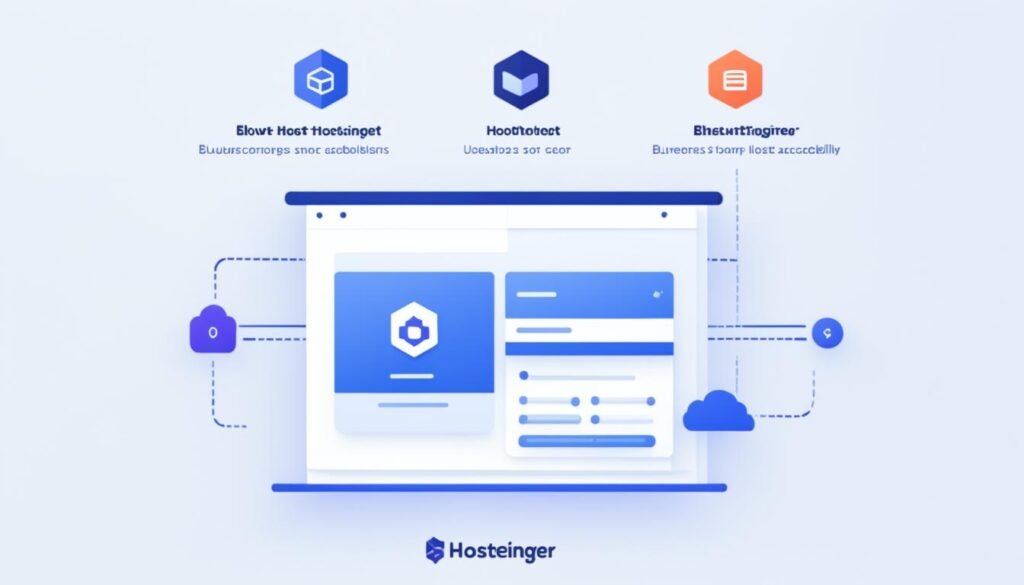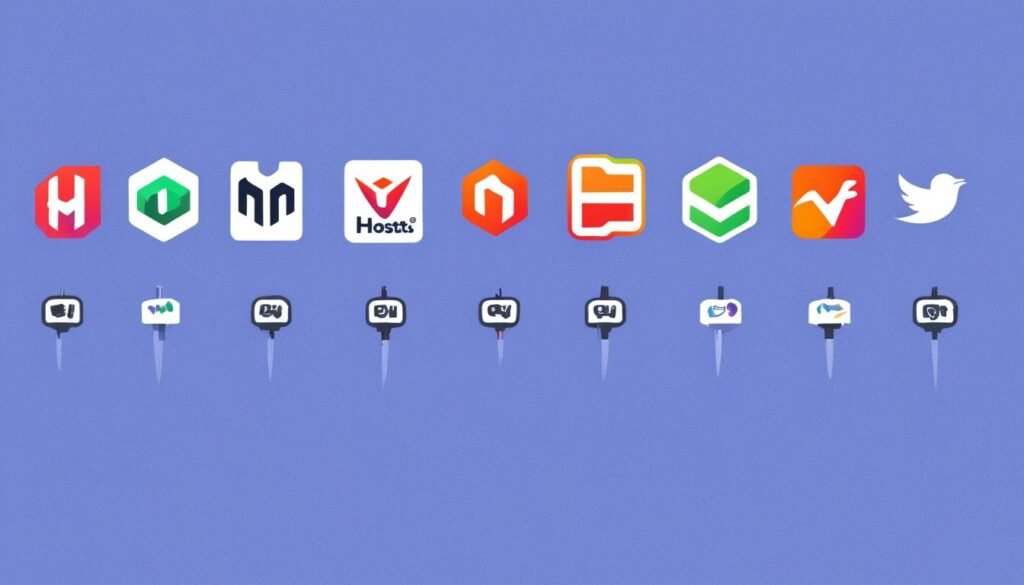When it comes to choosing a web host, Hostinger is often a popular choice due to its affordability and range of hosting plans. However, there may be other hosting providers that offer superior performance, uptime, and support. In this article, we will compare Hostinger with other hosting providers to determine which one is better for your online needs.
Key Takeaways:
- Hostinger is an affordable web hosting provider known for its range of shared hosting plans.
- When comparing hosting providers, it’s important to consider factors such as pricing, performance, customer support, features, and ease of use.
- Hostinger will be compared to other hosting providers such as Bluehost, InterServer, and GreenGeeks for a comprehensive analysis.
- By the end of this article, you will have a clearer understanding of whether hosting is better than Hostinger and which hosting provider suits your requirements best.
Hostinger vs Bluehost: A Price Comparison
When it comes to choosing a hosting provider, price is a crucial factor for many users. In this section, we will compare the pricing options offered by Hostinger and Bluehost to determine which one offers better value for money.
Hostinger is well-known for its affordable hosting plans, catering to individuals and small businesses on a budget. With their shared hosting plans starting as low as $1.39 per month, Hostinger offers a cost-effective solution for those looking to establish their online presence without breaking the bank.
On the other hand, Bluehost, another popular hosting company, also provides competitive pricing options. Their shared hosting plans start at $2.95 per month, which is slightly higher than Hostinger’s prices. However, Bluehost offers additional features and resources, such as unlimited websites, storage, and bandwidth, which may justify the higher cost for some users.
Table: Pricing Comparison
| Hosting Provider | Starting Price (per month) |
|---|---|
| Hostinger | $1.39 |
| Bluehost | $2.95 |
Based on the price comparison, it is clear that Hostinger offers a more affordable hosting solution compared to Bluehost. However, it’s important to consider your specific needs and budget when making a decision. While Bluehost may be slightly more expensive, it offers additional features and resources that may be beneficial for certain users.
In the next section, we will analyze the performance of Hostinger and Bluehost to determine if the superior pricing of Hostinger translates into better overall hosting performance.
Performance Comparison: Hostinger vs Bluehost
When it comes to website performance, choosing the right hosting provider is crucial. Fast load times and reliable uptime are essential for a smooth user experience and better search engine optimization. In this section, we will compare the performance of Hostinger and Bluehost to determine which one delivers superior web hosting performance.
Load Times and Uptime
Load times play a significant role in visitor satisfaction and engagement. A website that loads quickly ensures that visitors stay engaged and are more likely to convert into customers. Additionally, search engines prioritize fast-loading websites in their ranking algorithms, making it essential for SEO.
Bluehost boasts excellent load times, with an average of 1.10 seconds per page. Its optimized servers and caching technology contribute to its fast performance. On the other hand, Hostinger also offers impressive load times, coming in at an average of 0.45 seconds per page. This places Hostinger ahead in terms of load times, providing a better user experience for visitors.
Both Hostinger and Bluehost offer reliable uptime, ensuring that your website remains accessible without interruptions. Hostinger guarantees a 99.9% uptime, while Bluehost also provides a similar uptime guarantee. These numbers indicate that both hosting providers prioritize server reliability, minimizing downtime and ensuring your website is always up and running smoothly.
Server Response Time
Server response time, also known as Time to First Byte (TTFB), measures the time it takes for the server to respond to a user’s request. A lower server response time indicates better performance and faster loading times for visitors.
Bluehost showcases competitive server response times, averaging at approximately 334 milliseconds. This demonstrates its ability to quickly process user requests and provide fast content delivery. Hostinger, on the other hand, outperforms Bluehost with an average server response time of 232 milliseconds, indicating even better performance and quicker website loading.
Customer Support: Hostinger vs Bluehost

In the web hosting industry, good customer support is crucial for ensuring a smooth and hassle-free experience for users. Whether you are a beginner or an experienced website owner, having responsive and helpful assistance is essential when it comes to managing your hosting account.
In this section, we will evaluate the customer support provided by Hostinger and Bluehost to determine which host offers better support to their customers.
Hostinger’s Customer Support
Hostinger, known for its affordable hosting plans, aims to provide excellent support to its users. Their customer support team is available 24/7 via live chat and email, ensuring that customers can get assistance whenever they need it.
Hostinger also offers a comprehensive knowledge base and tutorials to help users troubleshoot common issues on their own. This empowers customers to find solutions quickly without relying solely on customer support.
Here are some key features of Hostinger’s customer support:
- 24/7 live chat and email support
- Comprehensive knowledge base and tutorials
- Quick response times
Bluehost’s Customer Support
Bluehost, a well-established hosting provider, also prioritizes customer support. They offer 24/7 support through live chat, phone, and email, ensuring that customers can reach out for assistance anytime.
In addition to direct support channels, Bluehost provides a vast knowledge base and a community forum where users can find helpful information and connect with other Bluehost customers.
Here are some key features of Bluehost’s customer support:
- 24/7 live chat, phone, and email support
- Extensive knowledge base and community forum
- Knowledgeable and friendly support agents
Comparing Hostinger and Bluehost Support
When comparing the customer support of Hostinger and Bluehost, both hosting providers offer reliable and responsive assistance to their customers. However, there are a few factors to consider when assessing which one provides better support for your needs.
Hostinger’s support team is known for its quick response times, making it ideal for users who value prompt assistance. On the other hand, Bluehost offers a variety of support channels, including phone support, which can be beneficial for users who prefer direct communication.
Ultimately, the better support option between Hostinger and Bluehost depends on your personal preferences and the level of support you require for managing your hosting account.
Features and Services: Hostinger vs Bluehost

The features and services offered by a hosting provider play a crucial role in determining the functionality and versatility of your website. In this section, we will compare the features and services of Hostinger and Bluehost, two leading hosting platforms, to help you make an informed decision.
Wide Range of Hosting Options
Hostinger offers a diverse range of hosting plans, including shared hosting, cloud hosting, VPS hosting, and WordPress hosting. Whether you’re a small business owner or an experienced developer, Hostinger has a solution that fits your unique needs.
Bluehost, on the other hand, primarily focuses on shared hosting and WordPress hosting. While these options are great for beginners and WordPress enthusiasts, if you’re looking for more specialized hosting solutions, Hostinger might be a better choice.
Host 100 Websites
If you have multiple websites or plan to launch additional sites in the future, Hostinger’s premium shared hosting plan allows you to host up to 100 websites on a single account. This flexibility makes it an ideal choice for businesses or individuals with multiple online ventures.
Bluehost, however, restricts the number of websites you can host on a single shared hosting plan, typically limiting it to one or a specific number of websites depending on the plan you choose.
Three Shared Hosting Plans
Hostinger offers three shared hosting plans: Single, Premium, and Business. The Single plan is an affordable option for small websites, while the Premium and Business plans offer more resources and advanced features.
Bluehost also provides shared hosting plans, ranging from Basic to Pro. The Basic plan is suitable for personal websites, and the Pro plan offers additional resources and features for larger websites or businesses.
Premium Shared Hosting
Hostinger’s premium shared hosting plan stands out with its premium features, including daily backups, free SSL certificates, and a WordPress acceleration plugin. These features enhance the security, performance, and reliability of your website, giving you peace of mind.
Bluehost also offers advanced features with its shared hosting plans, such as free SSL certificates, domain privacy, and marketing credits. However, the specific features may vary depending on the plan you choose.
Take a closer look at the comparison table below to see how the features and services of Hostinger and Bluehost stack up against each other:
After analyzing the features and services, it’s clear that both Hostinger and Bluehost have their strengths and cater to different hosting needs. Hostinger offers a wide range of hosting options, the ability to host multiple websites, and premium shared hosting features, making it a great choice for those looking for flexibility and advanced functionality.
On the other hand, Bluehost excels in shared hosting and WordPress hosting, providing solid performance and excellent support for WordPress users. If you prioritize ease of use and reliability for basic websites or WordPress projects, Bluehost might be the better option for you.
Ease of Use: Hostinger vs Bluehost

A user-friendly interface and intuitive features can greatly enhance the web hosting experience, making it easier for individuals and businesses to manage their websites. In this section, we will assess the ease of use of Hostinger and Bluehost, two popular hosting providers known for their user-friendly platforms.
Hostinger
Hostinger also prioritizes ease of use, aiming to provide a hassle-free experience for its users. The control panel offered by Hostinger is designed with simplicity in mind, allowing beginners to easily navigate and manage their hosting accounts. With Hostinger, you can easily install popular content management systems like WordPress and start building your website within minutes.
Additionally, Hostinger provides a user-friendly website builder that allows users to create a professional-looking website without any coding knowledge. The drag-and-drop interface and customizable templates make it easier for beginners to design and customize their websites to their liking. Hostinger’s customer support is also readily available to assist users with any questions or issues they may encounter during the hosting process.
Bluehost
Bluehost, on the other hand, also offers a user-friendly interface that caters to users of all levels of technical expertise. Their control panel, powered by the industry-standard cPanel, provides a familiar and intuitive environment for managing hosting accounts. With Bluehost, you can easily install popular website platforms such as WordPress, Drupal, or Joomla with just a few clicks.
Bluehost also provides a website builder that simplifies the process of creating a website. Their builder offers a range of templates and customization options, allowing users to create a unique online presence. Additionally, Bluehost offers a wealth of resources, including video tutorials and step-by-step guides, to help users navigate their hosting platform.
Both Hostinger and Bluehost strive to make the hosting experience as straightforward as possible, catering to beginners and more experienced users alike.
| Hostinger | Bluehost |
|---|---|
| Intuitive control panel | Familiar cPanel interface |
| User-friendly website builder | Range of customizable templates |
| Beginner-friendly setup process | Extensive resources and tutorials |
Overall, both Hostinger and Bluehost offer ease of use, ensuring that users can easily manage their websites without technical difficulties. The choice between the two largely depends on individual preferences and specific requirements. Regardless of the hosting provider you choose, you can expect a user-friendly experience that simplifies the process of hosting and managing your website.
Hostinger Alternatives: Other Top Hosting Providers

While Hostinger is a popular choice for web hosting, there are other top hosting providers that offer excellent performance, reliable server infrastructure, and exceptional customer support. If you’re considering alternatives to Hostinger, you have a range of options to choose from. In this section, we will introduce some of the best hosting providers that can meet your web hosting needs. Let’s explore.
1. Bluehost
Bluehost is one of the leading hosting companies in the industry. With a wide range of hosting plans and feature-rich services, Bluehost is a reliable web hosting provider for individuals and businesses alike. Their shared hosting plans are affordable and packed with useful features, making them a strong alternative to Hostinger. Additionally, Bluehost offers excellent customer support to ensure that any issues or concerns you have are promptly addressed.
2. SiteGround
SiteGround is another top hosting company known for its high-quality hosting services. They have powerful server infrastructure and provide a wide range of web hosting options, including shared hosting, cloud hosting, and dedicated servers. SiteGround is known for its exceptional performance, with fast-loading websites and great uptime. Their customer support is also highly regarded for its responsiveness and helpfulness, making SiteGround a reliable choice for web hosting.
3. DreamHost
If you’re looking for a hosting provider that prioritizes simplicity and user-friendliness, DreamHost is worth considering. They offer a range of hosting plans, including shared hosting, VPS hosting, and dedicated servers. DreamHost stands out for its commitment to open-source technologies and reliable uptime. Their hosting services are backed by knowledgeable customer support staff who are always ready to assist you with any inquiries.
4. A2 Hosting
A2 Hosting is a web hosting provider that focuses on speed and performance. They offer a range of hosting options, including shared hosting, VPS hosting, and dedicated servers. A2 Hosting is known for its Turbo Servers, which deliver faster page load times and better overall website performance. They also provide excellent customer support, ensuring that you receive the assistance you need when you need it.
These hosting providers are just a few examples of the top alternatives to Hostinger. They offer competitive hosting plans, reliable server infrastructure, and responsive customer support. By considering these alternatives, you can compare their features, pricing, and performance to make an informed decision that best suits your web hosting needs.
Remember, the key factors to consider when selecting a hosting provider include performance, uptime, customer support, and the range of hosting options they offer. Take the time to evaluate these aspects and choose the hosting provider that aligns with your specific requirements and budget.
In the next sections, we will continue to compare Hostinger with other leading hosting providers, such as Bluehost, InterServer, and GreenGeeks. This will provide you with a comprehensive overview of the top hosting services available and help you make an informed decision for your website or business.
Performance Comparison: Hostinger vs InterServer

After comparing Hostinger with Bluehost, we’ll now assess Hostinger’s performance against another web hosting provider, InterServer. This section will analyze the website performance and server reliability of both hosts to determine which one offers better hosting performance specifically for businesses.
When it comes to hosting a business website, performance is crucial. A slow-loading website can lead to high bounce rates and lost revenue. Therefore, it’s essential to choose a web server that can deliver fast and reliable performance.
Hostinger: Hostinger is known for its optimized infrastructure and performance-enhancing technologies. With data centers strategically located around the world, Hostinger ensures reduced latency and faster loading times for websites. Their web hosting plans come with a guaranteed uptime of 99.9%, minimizing any possible downtime that could negatively impact businesses.
InterServer: InterServer is also renowned for its high-performance web hosting. They leverage cutting-edge technology and state-of-the-art servers to provide excellent website speed and reliability. InterServer boasts a robust network infrastructure, ensuring optimal performance for businesses of all sizes. With their 99.9% uptime guarantee, businesses can trust InterServer to keep their websites available and accessible to customers at all times.
Both Hostinger and InterServer prioritize the needs of businesses and strive to deliver exceptional hosting performance. In the next section, we will compare the specific website performance metrics and analyze the server reliability of these two hosting providers to determine which one is better suited for businesses seeking top-notch hosting performance.
Performance Comparison – Hostinger vs InterServer
| Metrics | Hostinger | InterServer |
|---|---|---|
| Load Time | Faster | Fast |
| Uptime Guarantee | 99.9% | 99.9% |
| Server Reliability | High | High |
| Global Data Centers | Yes | Yes |
Performance Comparison: Hostinger vs GreenGeeks
In this section, we will compare the performance and hosting features of Hostinger and GreenGeeks to determine which one offers a better shared hosting plan. Both providers are known for their reliable web hosting services, but let’s take a closer look at how they stack up against each other.
Web Hosting Performance
When it comes to web hosting performance, GreenGeeks has established a solid reputation for delivering excellent speed and uptime. Their servers are built with cutting-edge technology to ensure optimal performance and reliability for websites of all sizes. On the other hand, Hostinger also boasts impressive performance metrics, with a focus on providing fast page load times and high server uptime.
Whether you prioritize speed or uptime, both Hostinger and GreenGeeks excel in delivering reliable web hosting performance to keep your website running smoothly.
Hosting Features
When comparing hosting features, Hostinger and GreenGeeks offer a wide range of services, with each provider catering to different needs.
Hostinger’s shared hosting plans provide scalability and flexibility, allowing you to easily upgrade your hosting resources as your website grows. They offer three shared hosting plans with varying features, including a premium shared hosting plan that supports hosting up to 100 websites.
On the other hand, GreenGeeks offers a robust hosting platform with a focus on eco-friendly practices. Their shared hosting plan includes unlimited disk space, bandwidth, and email accounts, as well as a free website builder and a 1-click WordPress installer.
Both Hostinger and GreenGeeks provide essential features and tools to help you build and manage your website effectively. The choice ultimately depends on your specific hosting requirements and preferences.
| Hosting Provider | Web Hosting Performance | Hosting Features |
|---|---|---|
| Hostinger | Impressive speed and uptime | Scalable shared hosting plans |
| GreenGeeks | Excellent performance and reliability | Eco-friendly hosting platform |
Hostinger and Bluehost Alternatives
Here are some alternatives to Hostinger and Bluehost:
- SiteGround
- A2 Hosting
- DreamHost
- InMotion Hosting
- HostGator
Website Builder & Web Hosting
“Website Builder & Web Hosting” refers to services that allow individuals and businesses to create and host their websites. Website builders provide tools for designing and customizing websites without coding knowledge, while web hosting services store the website files and make them accessible on the internet. They often offer integrated solutions for building, hosting, and managing websites.
SiteGround vs Hostinger: Features
Shared Hosting
Top Hostinger Alternatives in 2024
Unfortunately, it’s more difficult to recommend HostGator. Here’s a side-by-side comparison of Hostinger and HostGator to make the differences clear.
Conclusion: Is Hosting Better than Hostinger?
After conducting a comprehensive comparison between Hostinger and other hosting providers, including Bluehost, InterServer, and GreenGeeks, we have carefully evaluated several critical factors such as pricing, performance, customer support, features, and ease of use. Based on our analysis, we can now draw a conclusion on whether hosting is better than Hostinger.
In terms of pricing, Hostinger stands out as an affordable option, offering low-cost hosting plans that cater to budget-conscious individuals and small businesses. However, when it comes to overall performance and customer support, other hosting providers have showcased their superiority.
Bluehost, for instance, offers competitive pricing while still providing exceptional uptime and load times. Furthermore, their customer support services have been praised for their responsiveness and helpfulness. InterServer and GreenGeeks have also emerged as strong alternatives, boasting excellent hosting performance, robust features, and reliable shared hosting plans.
In conclusion, while Hostinger remains a solid choice for those seeking affordability, it falls short in terms of overall performance and customer support compared to other hosting providers. Depending on specific needs and priorities, individuals and businesses seeking superior performance, uptime, and support may find that alternative hosting providers such as Bluehost, InterServer, or GreenGeeks offer a better overall hosting solution. It is recommended to carefully consider these factors and prioritize them accordingly when making a hosting provider decision.
FAQs
Which hosting is better than Hostinger?
A: It ultimately depends on your specific needs and preferences. However, HostGator is often considered a strong alternative to Hostinger. It offers a wide range of hosting plans and packages, including shared hosting, VPS hosting, and dedicated hosting. HostGator is known for its user-friendly interface and excellent customer support.
Q: Is HostGator easier to use compared to Hostinger?
A: Some users find HostGator to be easier to use than Hostinger. HostGator provides a user-friendly control panel that makes it easy to manage your website and hosting settings. However, the ease of use can vary depending on individual preferences and familiarity with different hosting platforms.
Q: How does the website performance of HostGator compare to Hostinger?
A: Both HostGator and Hostinger offer good website performance. HostGator uses powerful server resources and infrastructure to ensure fast loading times and reliable website performance. Hostinger, on the other hand, utilizes a combination of optimized hardware, Litespeed web server, and a web application firewall to deliver excellent performance.
Q: What are some alternatives to Hostinger and HostGator?
A: If you’re looking for alternatives to Hostinger and HostGator, some popular options include Bluehost, SiteGround, and DreamHost. These hosting providers offer a variety of hosting solutions and have good reputations in the industry.
Q: Can Hostinger be used as a cloud hosting platform?
A: Yes, Hostinger provides cloud hosting services. It offers cloud hosting plans that are designed to provide high performance, scalability, and reliability. With cloud hosting, your website is hosted on multiple servers, ensuring minimal downtime and the ability to handle high traffic loads.
Q: Is there any comparison available of Hostinger with Bluehost?
A: Yes, there are several comparisons available between Hostinger and Bluehost. These comparisons often analyze factors such as pricing, features, performance, customer support, and user-friendliness to help users make an informed decision.
Q: What are some alternatives to Bluehost?
A: If you’re looking for alternatives to Bluehost, some popular options include SiteGround, HostGator, and A2 Hosting. These hosting providers offer similar features and performance to Bluehost and are well-regarded in the industry.
Q: Does Hostinger offer managed WordPress hosting?
A: Yes, Hostinger offers managed WordPress hosting services. With managed WordPress hosting, Hostinger takes care of tasks such as automatic updates, regular backups, and security, allowing you to focus on creating and managing your WordPress website.
Q: Are server resources limited in Hostinger?
A: Yes, Hostinger provides shared hosting plans where server resources are shared among multiple users. However, they also offer higher-level plans such as VPS and cloud hosting that provide more dedicated resources to individual websites.




